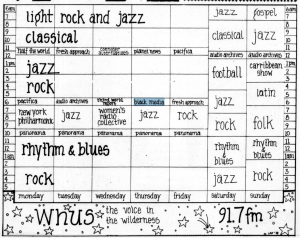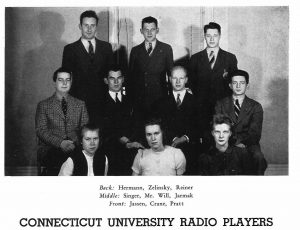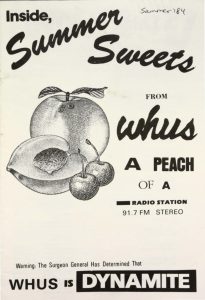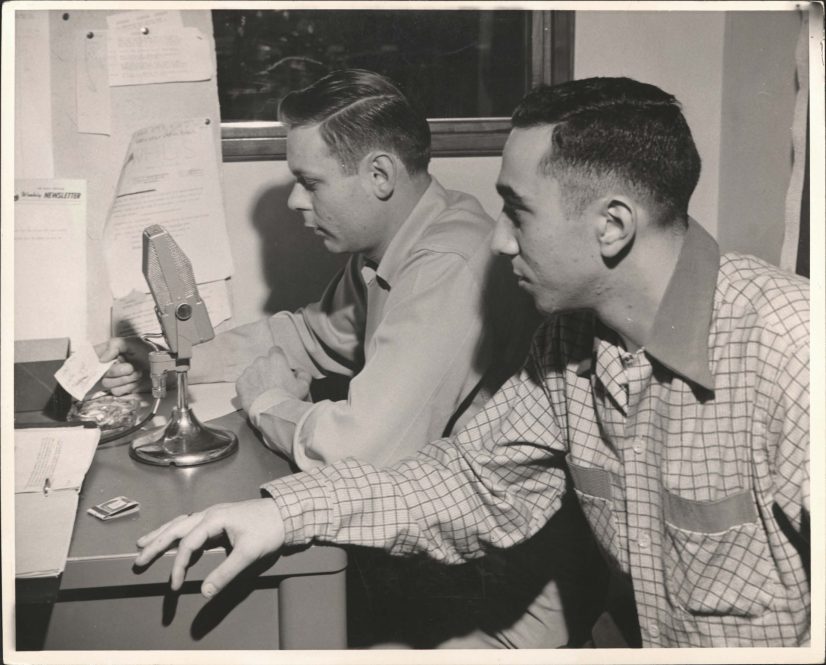UConn’s student-run radio station, WHUS, which broadcasts a wide variety of music along with University news and events, has been a staple of the student and community experience for over a century. To commemorate more than 100 years of student radio at UConn, Jonathan Kopeliovich ’24 (CLAS) has created the new WHUS History Archive.
“WHUS has been a place for people to express themselves, whether it’s through unique music, covering topics you’re interested in, or local news on campus, there’s just so many ways to get involved,” says Kopeliovich.
WHUS – 91.7 on the FM dial or online at whus.org – traces its history to 1923, when, largely thanks to an Engineering major named Daniel Noble, student radio in Storrs began with a 100-watt station using the call letters WABL, which would later change to WCAC and finally WHUS. Since that first broadcast, thousands of students and community members have participated in the station’s history as disc jockeys, journalists, technicians, and more.
For Kopeliovich, his involvement with the station culminated in becoming the Training Director for WHUS during his senior year, with his years at the radio station inspiring his career path.

“WHUS is the reason why I’m a journalist now. They provided me with a community and friends, and that was very valuable to me,” says Kopeliovich. “When it came time in senior year, I wanted to pay it forward and working on this was the perfect way to do it.”
Kopeliovich began the task of archiving the rich history of WHUS for his senior project and received essential help from UConn Library’s Department of Archives and Special Collections.
“What we do as an archive is identify materials that have long-term lasting information or documentation that is a value over time,” says Betsy Pittman, the University Archivist and Records Management Liaison Officer. “Anniversaries are a big trigger of interest, and now WHUS has this website they can refer to, drawing consciousness towards their long history.”
Pittman supported Kopeliovich in his endeavor to recover a century’s worth of audio tapes starting in 2023, during his senior year. They identified the collections that would enhance the creation of the project and went through boxes of tapes, prompting Kopeliovich to reach out to more than 80 people who had shows on WHUS over the years.
“What’s unique about the contribution of this archive is that it is a community-based archive,” says UConn Library Archivist Graham Stinnett, who interviewed Kopeliovich on WHUS’s archives podcast, d’Archive. “Jonathan’s approach to making a legible archive that is not physically held in just one place is part of a larger approach to archives that is far more empowering of individuals and their role in creating history about whatever that community is; in this case, it’s being a college DJ.”

While WHUS clearly had a profound impact on Kopeliovich himself, the interviews he conducted illustrated just how important WHUS is to so many members of the UConn community.
“If actions speak louder than words, taking time out of your day to talk about this niche radio station that you were a part of during a four-year period in your life speaks to how much WHUS impacted people,” says Kopeliovich.
Kopeliovich shares that this archive was a deeply collaborative effort and the support of his fellow students helped bring the project to life. The passion and excitement the WHUS community showed Kopeliovich during the creation of the archive showcases the true spirit of the station.
Kopeliovich notes that WHUS, by its nature, reflects the University community and events at UConn, citing some notable moments he discovered while developing the project.

“During a university protest by Black students, there was a DJ named Earl who would signal to students that it was time to come and join demonstrations by playing a specific song on WHUS,” says Kopeliovich. “Or once, International Women’s Day and a national championship for basketball fell on the same day, leading to the Women’s Radio Collective’s day of shows to be cancelled. So, they barred themselves into the studio” to keep broadcasting.
While these are only two of the many stories Kopeliovich got to hear while researching the history of WHUS, his archive allows anyone to learn about the moments that has made the radio station such a major part of the UConn story.
“This history being brought forward has helped students and WHUS members recognize that they’re carrying the banner of radio going forward, giving them more power to think about why radio and carrying on its legacy is important,” says Stinnett.
For the archivists, the documented history of one of UConn’s largest student-run organizations is a reminder of the merit of preserving memories.
“The University archives is all about the people,” says Pittman. “Everyone has their own unique reasons for coming here, but each one of those people who come here adds a little piece to the puzzle that is the history of the University and that experience is reciprocal. No matter how minuscule you think your experience here is, you have made a contribution. You are a piece of this massive puzzle that is UConn, and you deserve to be remembered and have your contribution recognized.”
For students – past, present, and future – the archive serves as a milestone and resource for decades of unforgettable experiences.
“The memories made at WHUS and the history that’s come along with it is valuable because it’s like holding up a mirror to student life over the last 100 years, letting WHUS serve as a cultural touchstone,” says Kopeliovich.



